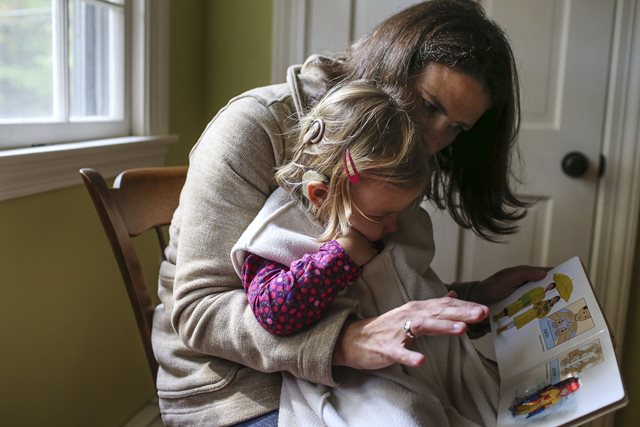A Mother's Fight: Maine's CDC CMV Recommendations
Author: Laura Sweet

Our three-year-old daughter, Jane, was born deaf due to congenital CMV. CMV also caused significant white matter abnormalities in her brain and a retinal scar in one of her eyes, leaving her at risk for developing seizures, learning difficulties, and vision problems. We were devastated when we learned of Jane’s deafness and these other complications caused by CMV. But what was equally shocking was learning that CMV is such a common and preventable virus, and that I had never been educated about its risks or precautionary measures to take during either of my pregnancies.
I felt a tremendous amount of guilt and regret. How could I have passed this horrible virus to my daughter when my body was supposed to provide the safest, healthiest environment for her? Considering more children have disabilities due to congenital CMV than other well-known causes including down syndrome, fetal alcohol syndrome, and spina bifida (all things I
was informed of or warned about), why had I, and so many others, never heard of it? If I had been armed with the facts, I know I would have altered my behavior accordingly. After all, I had conscientiously avoided soft cheeses, deli meats, raw fish, kitty litter, and alcohol throughout both of my pregnancies! Simple measures to prevent CMV such as avoiding shared utensils, food, or drinks with my toddler son, and being more vigilant about handwashing, especially after diaper changes or when he had a cold, could have made all the difference.
The more I learned about the lack of public awareness of CMV, the more I felt like I had to do something. It is completely unacceptable that only 9% of women have heard of CMV considering how widespread and devastating it is. My husband and I attended the CMV Public Health and Policy Conference in Austin, TX in September 2016 and learned about the advocacy efforts of other families impacted by CMV, and several states that had recently passed CMV legislation. I was so inspired! I left the conference feeling empowered and came home to Maine ready to take action.
I contacted my State Senator, Cathy Breen, in October 2016 to share our story and explain why increasing awareness of CMV is so important, and why babies born with CMV need to be identified and receive support as early as possible. I sent her copies of the bills from six other states that at that point had successfully passed CMV legislation, and asked if she would be willing to sponsor a similar bill requiring CMV education and screening in Maine. Thankfully, she was incredibly responsive, supportive, and proactive. Just three months later in January 2017, Senator Breen introduced LD 87, An Act to Require Screening for Cytomegalovirus in Newborn Infants. The bill was the first to propose universal CMV screening of all newborns and included provisions to educate women about the virus.
LD 87 was referred to the Legislature’s Joint Standing Committee on Health and Human Services and a public hearing and work session took place in February 2017. The whole process moved much more quickly than I anticipated. We gathered other families and supportive members of Jane’s medical and early intervention teams to testify alongside us. The Committee voted not to pass the bill, but with the understanding that the Maine Center for Disease Control and Prevention (CDC-P) would convene a work group to review issues surrounding congenital CMV and make recommendations to the Committee within a year.
The work group consisted of about 25 members including pediatricians, family physicians, infectious disease specialists, otolaryngologists, neonatal intensive care unit physicians, obstetricians, midwives, nurses, audiologists, early intervention specialists, and program managers and representatives from the Maine CDC-P, Maine newborn hearing program, and the March of Dimes. Dr. Mark Schleiss from the University of Minnesota served as a CMV expert, and I served as the parent representative. The work group met four times over the course of the year, and last month submitted a
final report to the Committee on Health and Human Services summarizing our findings and providing the following recommendations:
- Provide education on the causes, symptoms and prevention of cCMV to all parents, caregivers, and providers working with children, infants, and pregnant women.
- Convene a work group to develop and disseminate educational information and materials to key stakeholder groups.
- Require a targeted screening approach with the long-term goal of universal screening.
- Explore the option of utilizing bloodspot tests to screen for cCMV.
I am so proud of the work group’s
recommendations and honored to have been part of this truly collaborative effort. While our CMV bill may not have passed, several members of the work group commented that had we not proposed legislation, that group of busy doctors and professionals would likely never have found themselves around a table engaging in such important conversations about CMV. And as we anxiously await a response from the Committee on Health and Human Services to determine next steps at the state-level, some work group members have taken action themselves. For example, one pediatrician’s practice has implemented their own targeted CMV screening policy for any patients who do not pass their newborn hearing screening. One nurse midwife is now including information about CMV risks and prevention when providing prenatal care.
Having the buy-in and support of such a wide-ranging group of stakeholders will be invaluable as we move forward and work on implementing the group’s recommendations. Perhaps the work group or advisory committee model could be effective in other states exploring legislative possibilities as well. This is just the beginning for CMV education and screening in Maine, but I’m very proud of the progress we’ve made so far, and incredibly grateful for everyone who has worked so hard to support and contribute to our efforts!
Posted: 2/21/2018
Category: Advocacy, "Parent Perspective"